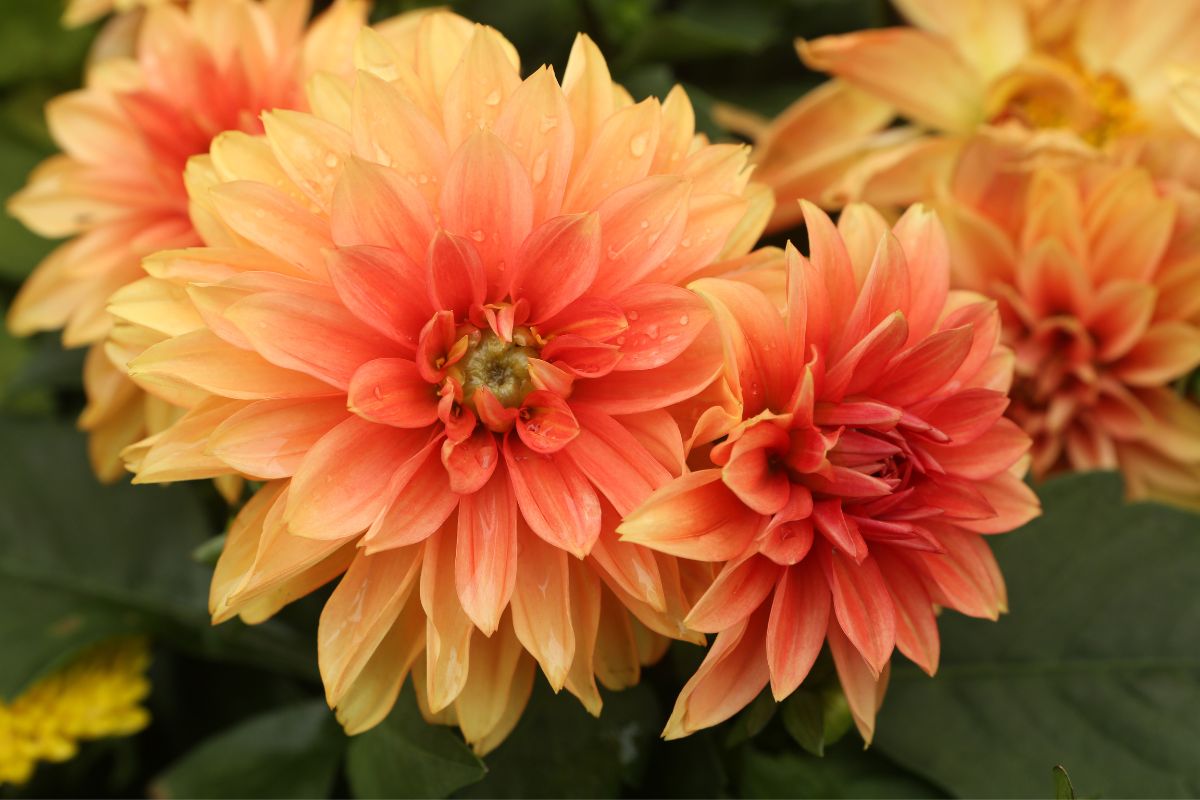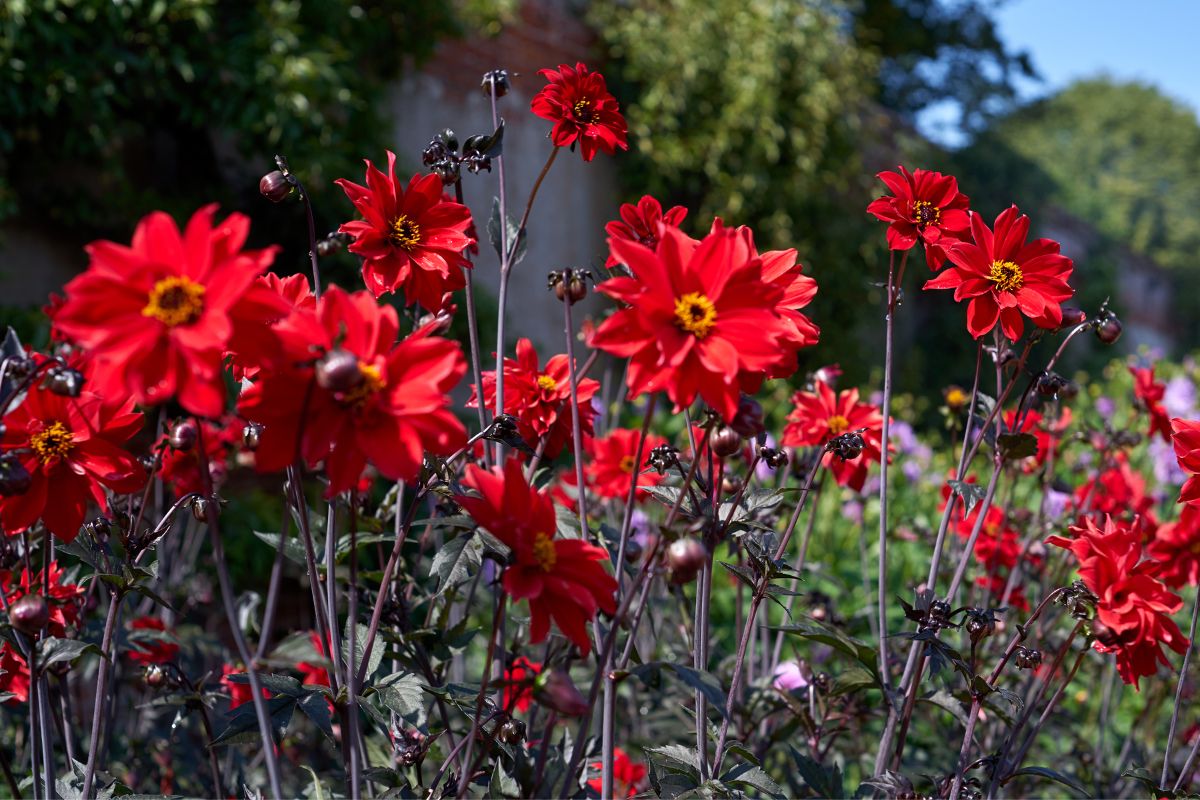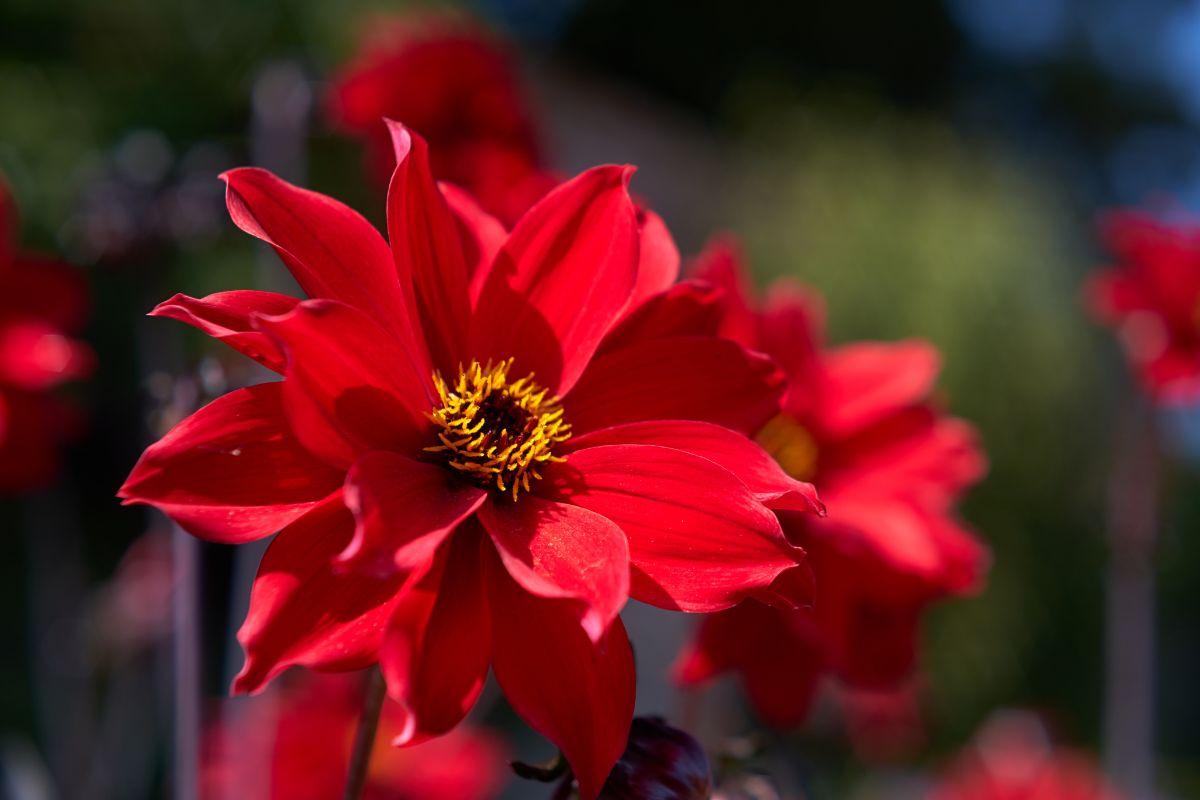The peony-flowered dahlia is Mexico’s national flower, a symbol of beauty and pride that has been celebrated for centuries. This stunning flower, with its vibrant colors and intricate petals, has been a beloved part of Mexican culture since pre-Hispanic times.

From its roots in Aztec mythology to its modern-day uses as an ornamental plant, the peony-flowered dahlia has been embraced by generations of Mexicans.
In this article, we took a closer look at peony-flowered dahlias, the best way to care for them, and the different beliefs and significance that they hold in a range of historical societies and cultures.
What Are Peony Flowered Dahlias?
Peony-flowered dahlias belong to the Asteraceae family and are a popular variation within the dahlia genus.
Originally from Mexico and Central America, they have been cultivated for ornamental purposes for centuries. These plants are easily identifiable by their large and colorful flower heads that range from light pink to dark purple.
Peony-flowered dahlias are a popular choice for gardens and flower beds due to their hardiness and ease of care.
They are often grown in large clusters for an eye-catching display and are well-suited to Mexico’s arid climate as they are relatively drought tolerant.
Where Does The Name Peony Dahlia Come From?
The name “Peony Dahlia” is thought to have Greek origins, with ‘peon’ and ‘dahl’ meaning “flower of the gods.
The flower was possibly named after Peon, a legendary figure in Greek mythology. The term dahlia is derived from the Swedish botanist Anders Dahl, who named the flower in 1791.
Peony dahlias have large blooms up to 20 cm in diameter and multiple layers of petals, resembling a peony. They come in various colors from pastels to bold hues and can bloom from July to October, perfect for late summer or autumn gardens.
They are versatile and come in various shapes and sizes, with a range of varieties to choose from. Some of the most popular varieties include:
Kelvin Floodlight
The Kelvin Floodlight variety is well known for its vibrant yellow petals, which can be seen in full bloom during the summer months, offering a real summery vibe to any garden.
Bishop Of Llandaff
The Bishop of Llandaff is a dark red flower with frilly petals, commonly selected for its unique appearance in gardens, and can help you to create a unique, exotic vibe.
Penhill Watermelon
The Penhill Watermelon variety displays a distinctive pinkish-red hue and has uniquely waved petal edges. It is a commonly selected option for adding a pop of color to gardens.
Perch Hill
The Perch Hill variety is a deep pink color that adds a colorful, cheerful feel to any garden, and it is a commonly chosen option for those seeking to add a pop of color to their home and garden.
Penhill Dark Monarch
The Penhill Dark Monarch is a purple variety of flowers with frilly petals. It is a commonly chosen option for those seeking an elegant and sophisticated addition to their garden.
Black Beauty
The Black Beauty variety is characterized by its deep black or dark purple color and frilly petal edge, making it a favored option for those seeking to introduce an exotic touch to their garden.
Moonfire
The Moonfire variety displays orange or yellow petals that have a distinct wavy edges. It is a commonly chosen option for individuals seeking to incorporate a pop of color into their garden.
Cafe Au Lait
The Cafe Au Lait variety is striking pink and white, with an intricate frilled edge to its petals. It is a popular choice for those looking to add a touch of elegance and sophistication to their garden.
Labyrinth
The Labyrinth variety is a black and white flower with a frilled edge to its petals which can add a sense of sophistication and mystery to their garden.
Caring For Peony Dahlias
Peony dahlias require proper care and thrive in well-drained, moist soil. Regular watering and occasional fertilizing can promote growth.
It is recommended to provide support such as staking or a cage to prevent the flower heads from causing the plant to tip over.
If you’re interested in learning how to care for your peony dahlias, keep reading for some helpful tips.
Planting
The key to successful peony dahlia gardening is choosing the right location for planting. Peony dahlias require well-draining soil and full sun exposure.
Ensure that the planting location has excellent drainage, and avoid planting them under trees or near other plants that might shade them.
They should be planted in the spring, after the risk of frost has passed, and require regular watering in the growing season – but you must take care not to overwater them as they can be susceptible to rot.
Peony dahlias can benefit from a balanced fertilizer or compost every few weeks.
Watering
Peony dahlias require adequate watering to thrive. Water your dahlias regularly, especially during the growing season.
It’s best to water consistently and deeply to ensure the soil remains moist but not waterlogged. Watering can be done using a hose or watering can, and it’s essential to avoid wetting the leaves as this can cause mildew.
Fertilizing
Peony dahlias require regular fertilization to enable them to grow strong and produce healthy blooms. When planting, it’s advisable to mix in some compost or well-rotted manure to provide nutrients to the soil.
During the growing season, fertilize your dahlias every few weeks using a balanced fertilizer or one that has a high phosphorus component.
Deadheading
Deadheading is an essential practice in caring for peony dahlias. It involves the removal of spent blooms to encourage the growth of more flowers.
Once the blooms have faded, use a clean and sharp pair of gardening shears to cut them off, making sure to cut just above the leaf bud. If you live in areas with harsh winters, it’s best to dig up and store the tubers in a cool, dry place until spring.
Winterizing
Peony dahlias are susceptible to frost damage during winter. To protect them from low temperatures, cut down the foliage to ground level and dig up the tubers to store them in a cool, dry location throughout the winter months.
Caring for peony dahlias requires a bit of effort and commitment, but the results are worth it. By following the tips outlined above, you can ensure that your peony dahlias thrive and produce beautiful blooms throughout the growing season.
How Did The Peony Flowered Dahlia Become The National Flower Of Mexico?

So, just how did the peony-flowered dahlia become Mexico’s national flower? To answer this question, we must delve deep back into history.
In pre-Hispanic times, the peony flowered dahlia was associated with the Aztec goddess Xochiquetzal.
This goddess was believed to be the embodiment of beauty and love, and her symbol was a sun disk surrounded by petals, resembling the shape of a dahlia flower head.
The roots of the bloom in Aztec mythology and its vibrant colors made it an ideal symbol of beauty and pride, and this, combined with an association with Xochiquetzal, the goddess of beauty and love, was likely a factor in the decision to make the peony flowered dahlia the official flower of Mexico in 1963 when it was designated by the Mexican government as a way to honor the country’s history and culture
The flower’s popularity among Mexican citizens also played a major role, and it was commonly used in medicinal and herbal remedies, as well as for ornamentation purposes. Since then, it has been featured on various Mexican coins, stamps, and other official documents.
The peony-flowered dahlia has also come to represent Mexican culture and identity. As a national symbol, it is often seen in paintings, sculptures, and other forms of art as a way to honor the nation’s history and people.
It is also used in cultural events to showcase the country’s vibrant culture, including festivals and parades.
The flower is even featured on logo designs for companies and organizations throughout the country to promote their products or services.
Historic And Cultural Beliefs About Peony Flowered Dahlias
Different cultures throughout history have held different beliefs about the peony-flowered dahlia, and we took a closer look at some of the main beliefs in different historical cultures and periods.
Aztec Beliefs About The Peony Flowered Dahlia
As we mentioned, the popularity of the peony-flowered dahlia in Mexican culture has its roots in Aztec mythology- but just what is the story?
The Aztecs believed that Xochiquetzal, the goddess of beauty and love, lived in a large flower made of petals resembling a dahlia.
This flower was said to have magical powers, and it was thought that if someone walked through its petals, it could make them more attractive, or even make them fall in love.
In addition to its association with Xochiquetzal, the peony-flowered dahlia was also thought to bring good fortune and protection.
It was believed that if someone carried a dahlia flower with them, it would ward off evil spirits and bring luck. – a belief that continues today, and many Mexicans still carry the flower for luck and protection.
The peony-flowered dahlia is a beautiful symbol of Mexico’s culture, history, and beliefs, and it has a special place in the hearts of many Mexicans.
Its vibrant colors, unique shape, and association with Xochiquetzal make it an ideal choice for Mexico’s national flower.
The Symbolism Of Dahlia Flowers In The Victorian Era
Another interesting aspect of the symbolism of peony dahlias is the meaning that they held in the Victorian era. During this time, people used floral symbolism to express their thoughts and feelings.
In Victorian times, peony dahlias symbolize wealth, power, and success. They were seen as a sign of abundance and prosperity and were often given as gifts to show admiration and appreciation.
Peony dahlias were also associated with relationships, and they were given as a symbol of commitment and love.
Ancient Greece And Peony Flowered Dahlias
Peony-flowered dahlias were also important in Ancient Greece. They were thought to be connected to the goddess Demeter, who was the goddess of fertility and agriculture.
According to Ancient Greek mythology, Demeter once transformed into a stunning dahlia flower to hide from her brother Hades, god of the underworld.
The peony-flowered dahlia also symbolized protection in Ancient Greece. It was believed that if someone carried a dahlia with them, it would protect them from harm and danger.
Medicinal Properties Of Peony Flowered Dahlias

The peony flowered dahlia is a beautiful flower with a unique shape and vibrant colors, and it also has the added bonus of offering a number of medicinal properties, as the petals of the peony flowered dahlia contain a number of compounds that can help treat a variety of ailments. These include:
Contain Antioxidants
Peony-flowered dahlias contain antioxidants that can aid in protecting cells from oxidative stress, which is linked to several ailments such as heart disease, diabetes, and cancer.
The antioxidants in peony dahlias help to counteract free radicals and may assist in preventing these conditions.
The peony-flowered dahlia also contains antioxidants that can lower inflammation and enhance the immune system.
It’s a good source of vitamins A and C, and minerals like iron and calcium, which contribute to improved health and wellness, allowing you to boost your overall well-being and stay healthy.
Anti-Inflammatory Properties
Peony dahlias contain natural compounds that have anti-inflammatory effects. This makes them useful in treating conditions like arthritis, gout, and bronchitis. The anti-inflammatory properties of peony dahlias can also help in reducing inflammation-related pain.
Treat Digestive Issues
The peony-flowered dahlia has also been used to treat digestive issues such as indigestion, stomach aches, and cramps. When consumed as a tea, it can help ease gastrointestinal discomfort and aid digestion.
Flowers have also been found to help with reducing inflammation in the gut, promote healthy gut flora, and improve overall digestion. They can also help to improve nutrient absorption in the gut, allowing you to get the most out of your diet.
Antimicrobial Properties
Peony dahlias have been found to have antimicrobial effects. This means that they can inhibit the growth of harmful bacteria and fungi. Peony dahlias can be used to treat skin infections, fungal infections, and other minor infections.
Anti-Anxiety Properties
Peony dahlias have been used in traditional medicine to provide relief from anxiety and stress. The flowers contain several compounds that can help to calm the mind and promote relaxation.
Drinking tea made from peony dahlia petals or using the essential oil in aromatherapy can provide relief from anxiety and promote overall wellness.
Skin Health
Peony dahlias contain several compounds that can benefit the skin. They are rich in antioxidants that can help to protect the skin from damage caused by free radicals.
They also contain anti-inflammatory compounds that can help to reduce redness and inflammation in the skin. Using skincare products containing peony dahlia extract can help to improve the overall health and appearance of the skin.
Peony dahlias are more than just beautiful flowers. They offer several health and wellness properties that have been used for centuries in traditional medicine.
Their anti-inflammatory, digestive, anti-anxiety, and skincare properties make them a valuable addition to any wellness routine. Incorporating peony dahlias into your diet or skincare routine can help to promote overall health and well-being.
Spiritual Significance Of Peony Dahlias
As we have seen, many cultures – including Mexico – consider the peony dahlias to have significant spiritual properties, and we took a closer look at the spiritual significance of this beautiful flower.
Mexican culture is based on a strong relationship with nature and its elements, and for many people, peony dahlias are seen as a symbol of hope and renewal.
They are thought to bring positive energy into the home, ward off bad luck, and foster good relationships, and also offer a number of other spiritually significant properties, including:
A Symbol Of Prosperity And Good Fortune
In many cultures, peony dahlias are a symbol of prosperity and good fortune. They are believed to bring wealth and success to those who have them in their homes or gardens.
Peony dahlias are also associated with abundance and prosperity in fields like finance, business, and marketing.
A Symbol Of Love And Romance
Peony dahlias are also associated with love and romance, and they are often given as gifts to express affection and admiration.
The intricate, delicate petals of the peony dahlia represent the delicate nature of love, which needs to be nurtured and cared for to bloom.
A Symbol Of Healing
Peony dahlias are also believed to have healing properties. They are associated with physical and emotional healing. The bright, vibrant colors of the peony dahlia, combined with its intricate petals, are said to bring comfort and healing to those who are suffering.
Symbol Of Strength And Resiliency
Finally, peony dahlias are a symbol of strength and resiliency. They are able to withstand harsh weather conditions and still bloom beautifully every year.
In this way, they represent the strength and resilience that we need to cultivate within ourselves to overcome challenges and thrive in life.
Mental Health Benefits
In addition to the spiritual and physical benefits, peony dahlias may also provide mental health benefits. Studies have indicated that these flowers can be used to reduce levels of stress and anxiety in those who are suffering from mental health issues.
The calming colors of the petals, combined with the sweet smell, may help to relax the mind and improve overall well-being.
Final Thoughts
The peony dahlia is a beautiful flower that has been used for centuries in traditional medicine. It offers several health benefits, including anti-inflammatory, digestive, anti-anxiety, and skincare properties.
Additionally, Peony dahlias have deep spiritual and symbolic meaning in many cultures, including Mexico, where they are the national flower.
These beautiful blooms can be used to bring positive energy into the home and foster good relationships, as well as symbolize prosperity, love, and resilience.
- Interesting Flowers That Start With A - July 21, 2023
- Interesting Flowers Beginning With H - July 21, 2023
- 14 Fascinating Flowers That Begin With C - July 20, 2023
